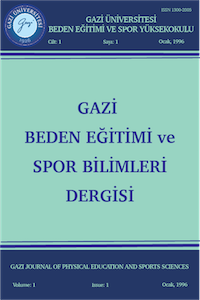Abstract
Kas hacminin
sporcuların performansını etkilediğine inanılır. Bacak kaslarının kuvveti
performansta önemli rol oynar. Bu yüzden, bireysel ve takım başarısını
sürdürmek için vücudun kemik, kas, yağ ve diğer parçaları hakkında bilgi sahibi
olmak önemlidir. Bu çalışmada, tarafsız bir yaklaşım olan stereolojik yöntemle
hesaplanan futbolcuların bacak bölgesi toplam kas hacmini ile bacak
antropometrik verileri arasındaki ilişkiyi inceledik. Bu amaçla, yaşları 16-19
arasında değişen 30 erkek futbolcunun verileri analiz edildi. Önce bacak
çevresi ve uzunluğu antropometrik olarak ölçüldü, sonra bacak kaslarının hacmi
MR görüntüleri üzerinde stereolojik metotlar kullanılarak hesap edildi.
Ortalama bacak uzunluğu 48,30±0,28 cm, ortalama bacak çevresi 36,32±0,41 cm
bulundu. Bacağın toplam kas hacmi 1526,53±25,11 cm3 olarak hesap edildi. Elde
edilen verilerin istatistik analizleri; antropometrik ölçümlerle bacak toplam
kas hacmi arasında yüksek korelasyon olduğunu gösterdi (r = 0,451; p = 0,000).
Antropometrik ölçümler kullanarak bacak toplam kas hacmini hesap etmek için bir
regresyon formülü önerdik. Sonuç olarak önerdiğimiz formül, karmaşık aletler ve
ilave hesaplar gerektirmeksizin futbolcuların toplam kas hacmini hesaplamak
için kullanılabilir.
References
- Esformes JI, Narici MV, Maganaris CN. Measurement of Human Muscle Volume Using Ultrasonography. Eur J Appl Physiol 87:90-2, 2002.
- Gadeberg P, Andersen H, Jakobsen J. Volume of Ankle Dorsiflexors and Plantar Flexors Determined with stereological techniques. J Appl Physiol 86:1670-5, 1999.
- Wang J, Horlick M, Thornton JC, Levine LS, Heymsfield SB, Pierson NP. Correlations Between Skeletal Muscle Mass and Bone Mass in Children 6-18 years: Influences of Sex, Ethnicity and Pubertal Status. Growth, Development and Aging 63 (3),99-109, 1999.
- Fuller NJ, Hardingham CR, Graves M, Screaton N, Dixon AK, Ward LC, Elia M. Predicting Composition of Leg Sections With Anthropometry and Bioelectrical Impedance Analysis, Using Magnetic Resonance Imaging as Reference. Clin Sci (Lond) 96:647-57, 1999.
- Miyatani M, Kanehisa H, Fukunaga T. Validity of Bioelectrical Impedance and Ultrasonographic Methods for Estimating the Muscle Volume of the Upper Arm. Eur J Appl Physiol 82:391-6, 2000.
THE RELATION BETWEEN TOTAL MUSCULAR VOLUME AND ANTHROPOMETRIC MEASUREMENTS OF THE LEG IN FOOTBALL PLAYERS
Abstract
The volume of the
muscle is believed to have an effect on the performance of football player.
Strength of the leg muscles roles in the performance. Therefore, it is crucial
to have information on body components such as muscles, bone, fat and others in
order to sustain personal and team success. In this study, we aimed to propose
a simple way to predict the total muscular volume of leg in football players
and compare this result with antopometric data. Data collected from thirty male
football players of average age 17.3 (between 16-19 years old) were analyzed.
First we measured the leg circumference and length anthropometrically and then
we estimated the total volume of the leg muscles using stereological methods on
magnetic resonance images. The mean leg length and circumference was 48.3±28cm
and 36.3±41cm, respectively. The total muscular volume of leg was
1526.53±25cm3. Our data showed that there was a highly correlation between the
anthropometric measurements and the total muscular volume of leg region (r=0.451,
p=0.000). We proposed a regression formula for the prediction of total muscular
volume of leg using the anthropometric data. We think that the proposed formula
could be used to predict the total muscular volume of football player without
requiring intricate tools without additional coasts
References
- Esformes JI, Narici MV, Maganaris CN. Measurement of Human Muscle Volume Using Ultrasonography. Eur J Appl Physiol 87:90-2, 2002.
- Gadeberg P, Andersen H, Jakobsen J. Volume of Ankle Dorsiflexors and Plantar Flexors Determined with stereological techniques. J Appl Physiol 86:1670-5, 1999.
- Wang J, Horlick M, Thornton JC, Levine LS, Heymsfield SB, Pierson NP. Correlations Between Skeletal Muscle Mass and Bone Mass in Children 6-18 years: Influences of Sex, Ethnicity and Pubertal Status. Growth, Development and Aging 63 (3),99-109, 1999.
- Fuller NJ, Hardingham CR, Graves M, Screaton N, Dixon AK, Ward LC, Elia M. Predicting Composition of Leg Sections With Anthropometry and Bioelectrical Impedance Analysis, Using Magnetic Resonance Imaging as Reference. Clin Sci (Lond) 96:647-57, 1999.
- Miyatani M, Kanehisa H, Fukunaga T. Validity of Bioelectrical Impedance and Ultrasonographic Methods for Estimating the Muscle Volume of the Upper Arm. Eur J Appl Physiol 82:391-6, 2000.
Details
| Subjects | Sports Medicine |
|---|---|
| Journal Section | Articles |
| Authors | |
| Publication Date | October 15, 2007 |
| Submission Date | April 17, 2017 |
| Published in Issue | Year 2007 Volume: 12 Issue: 4 |
Gazi Journal of Physical Education and Sports Sciences is a scientific and peer-reviewed journal published quarterly.


